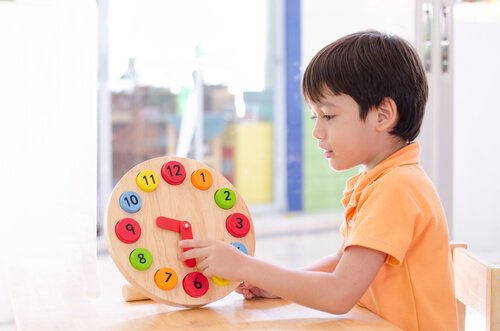Why You Should Teach Your Children to Be Punctual

Why is it important to teach children to be punctual? We must begin with the fact that we live in a society governed by order. In order for everything to work properly, we need to agree on a way to establish time and schedules so that all of our activities can be coordinated and fulfilled.
Without schedules and punctuality, our world would be chaotic. Because we live in a society, we must work, learn and live together based on order and time.
In this article we’ll explain why teaching children to be punctual is so beneficial.
Why you should teach your children to be punctual
Punctuality is one of the most appreciated human qualities in any society. It’s so important that it’s linked to moral values such as honesty, truth and credibility.
Someone who isn’t punctual can easily be classified as irresponsible, untrustworthy or even a liar. To successfully carry out any activity, such as work or studies, we must abide by the schedules established by our colleagues and superiors.
Taking these considerations into account, it’s important for us to teach our children that they have a commitment to themselves and to society. Not being punctual is a negative trait and prevents us from being the best people we can become.

Negative aspects of tardiness
When you talk to your child about punctuality, it’s imperative that you explain the disadvantages based on specific examples.
Teaching a value simply by affirming that something is bad or good without sufficient examples makes the idea too abstract for children, and they won’t be able to understand the concept.
Below we’ll present a few examples that you can use with your children to help them understand the negative aspects of being late:
- If we order a pizza and the delivery person doesn’t use a watch and doesn’t arrive on time, then we won’t have dinner.
- If the referee doesn’t arrive on time for our favorite soccer team’s match, the game cannot begin.
- If parents don’t bring their children to school on time, they won’t be able to complete their work and may fall behind in their studies.
- If we don’t use our time wisely to get ready for school in the morning, we’ll be late and will also make our parents arrive late to work.
When children understand that punctuality isn’t a whim but actually affects the lives of others, they’ll also learn values such as solidarity.
“Punctuality is so important that it’s linked to moral values such as honesty, truth and credibility.”
How to teach your children to be punctual
We’ve already reviewed why it’s important to teach your children to be punctual. Now, we’ll provide some ideas for teaching exercises you can use at home. This way, you can encourage your children to be responsible.
- Teach them how to use analog clocks, and also explain the time measurement system.
- Give them an agenda or planner to record their class hours, their activities and any of their commitments. Reward them by adding a sticker on their calendar whenever they complete their activities on time.

- Help them plan times in which they can carry out their activities: for example, preparation before school should take an hour; homework takes two hours; cleaning their room takes an hour and a half. These exercises will be beneficial to children who are learning to be organized and prepared ahead of time to meet their commitments.
- Educate by example: it’s important for our children to also see that attitude of responsibility and respect toward others in us. Try to pick them up on time from school, and above all, don’t make promises or agreements that you cannot fulfill.
We’re confident that with these simple ideas, your children can learn the importance of adhering to society’s rules, as well as the value of fulfilling their obligations on time.
In addition, they’ll demonstrate their respect toward others. Go ahead and start teaching them to plan their days and activities.
All cited sources were thoroughly reviewed by our team to ensure their quality, reliability, currency, and validity. The bibliography of this article was considered reliable and of academic or scientific accuracy.
- Valdez, L. C. (2014). Tú y los valores humanos. Palibrio.
- Miguel Agüero. (2016). La puntualidad habla de ti.
- VARGAS, Q., & DAVID, L. (2017). CREACIÓN Y DISEÑO DE UN CUENTO INTERACTIVO MULTIMEDIA PARA REFORZAR EL VALOR DE LA PUNTUALIDAD A NIÑOS DE 7 A 10 AÑOS DE LA ESCUELA FISCAL” COSTA RICA” DEL SECTOR NAYON DE LA CIUDAD DE QUITO (Bachelor’s thesis). http://www.dspace.cordillera.edu.ec/handle/123456789/3669
